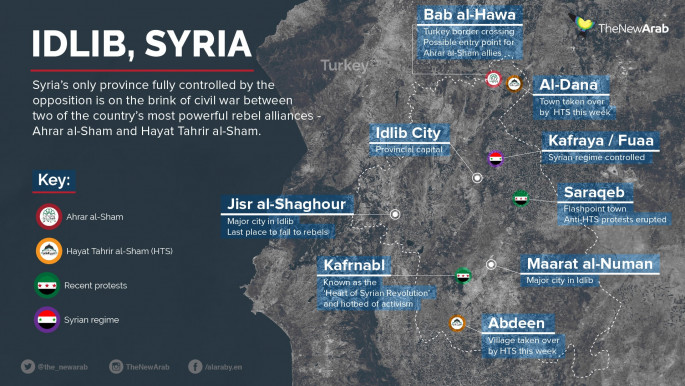IS driven out of Syria's Idlib after 'regime-enabled' incursion
It follows a surprise offensive by IS into the province, which pro-oppositon Syrian activists claim was enabled by the regime to target rebel groups there.
IS fighters captured Idlib village of Bashkun at the weekend after clashes with Hayat Tahrir al-Sham, an alliance of rebel forces dominated by a former al-Qaeda affiliate.
"After fierce fighting, Tahrir al-Sham has once again chased IS out of Idlib," said the Syrian Observatory for Human Rights, a UK-based monitor.
Re-run
The setback comes more than three years after IS was first expelled from the province in north-western Syria after battles with rival jihadis and rebel groups.
IS has seen the so-called "caliphate" it declared in 2014 across parts of Syria and Iraq crumble in recent weeks, losing key cities such as Raqa and Mosul.
Rebel-aligned activists claim the Syrian regime and its allies have been cynically encouraging IS to fight the rebel groups in Idlib, in an attempt to break their resistance and later use IS as an excuse for an all out assault on the province.
"The regime wants to force the rebels to fight on new fronts to undermine their resistance by allowing IS elements to enter the province... and gain a pretext later assault the province," Ibrahim Bakour, local pro-rebel activist, told The New Arab.
Twitter Post
|
The Syrian army and Iranian-backed militias backed by Russian air power have recently stepped up their military campaign against rebels in eastern Hama province.
This is seen as a push towards Idlib in north-western Syria, the only province almost completely under rebel control.
They said dozens of aerial strikes believed to be conducted mainly by Russian jets in the last 48 hours hit opposition held villages and towns in the northeastern Hama countryside and the southern part of Idlib province.
Joint offensive
Hayat Tahrir al Sham and some Free Syrian Army (FSA) rebel factions sent reinforcements to seize back a string of villages in the north-eastern Hama countryside, near the town of Rihjan, that the army had earlier announced were captured in heavy fighting.
The army said the villages of Um Turayka, Bilil, and Rujum al-Ahmar were seized, forcing the rebels to flee to areas close to the administrative boundaries of Idlib province.
The Syrian army lost the strategically-located Idlib province to insurgents when the provincial capital fell to rebels in 2015. It has since become the only province that is fully under opposition control.
 |
Ankara's intervention seeks to rein in Russian strikes and prevent Idlib from facing a similar fate to Mosul or Aleppo. |  |
The Syrian army's first goal was to retake strategic Abu al-Dhour military airport, one of the largest airports in the north of the country that fell to rebels in 2015. It was heavily bombed on Sunday, a rebel source said.
"The regime movements seek to besiege Idlib province with the help of Shia militias fighting with them," said Colonel Mustafa Bakour, a commander in the Jaish al-Izza rebel faction.
Hayat Tahrir al-Sham is the main rebel force in the province, raising fears among civilians and rebels alike that Moscow and the Syrian army and its allies would soon turn it into a major battlefield.
The strategically located province that borders Turkey is part of the Russian-led de-escalation zones that seek to shore up ceasefires in western Syria.
Idlib has been a haven for tens of thousands of rebels and civilians who were forced to abandon their homes in other parts of western Syria that the regime and its foreign military allies have recaptured from rebels.
It has already been the target of intensive strikes by the Russia and Syrian air forces in the past year that have killed thousands of civilians and destroyed hospitals and civil defence centres.
Damascus' advance towards Idlib is also piling pressure on Turkey which had since October begun a major military deployment around the province it considers within its sphere of influence.
Rebel province
Ankara's intervention seeks to rein in Russian strikes and prevent Idlib from facing a similar fate to Mosul or Aleppo, according to a senior rebel commander briefed on Turkish policy.
The Syrian conflict began when the Baath regime, in power since 1963 and led by President Bashar al-Assad, responded with military force to peaceful protests demanding democratic reforms during the Arab Spring wave of uprisings, triggering an armed rebellion fueled by mass defections from the Syrian army.
According to independent monitors, hundreds of thousands of civilians have been killed in the war, mostly by the regime and its powerful allies, and millions have been displaced both inside and outside of Syria.
The brutal tactics pursued mainly by the regime, which have included the use of chemical weapons, sieges, mass executions and torture against civilians have led to war crimes investigations



